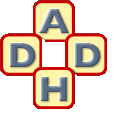
| Home |
| ADHD: A Parent’s Primer |
| Learning Disabilities: A Parent’s Primer |
| Behavior Disorders: A Parent’s Primer |
| More Resources |
| Other Publications |
| About Dr. Waksman |
| Contact Info |
| A Parent’s Primer on ADHD | ||||
By Steve Waksman, Ph.D. Printer-Friendly Version | PDF Version
There is no reason to believe that these children will outgrow these behaviors. Many hyperactive children do tend to get less active, or less hyperactive, as they grow older, but most still behave in impulsive, immature an/or inattentive ways. Children with attention deficits often need special management procedures as long as they attend school or live with their families. Such children have a much more positive prognosis if they do not develop severe behavior, academic or peer problems. The combination of attention, conduct and learning problems often leads to school failure, early school dropout and/or serious psychological problems. How
do we test for attention deficits? How is it treated? With medication, children are able to control their behavior and impulses, and seem to get along better with their peers. They are also more easily managed and more responsive to special education procedures and parental tutoring. There are, however, unpleasant side effects from the drugs in about 20% of the cases. Such side effects may include sleep disturbances, loss of appetite, stomachaches or headaches. Also the medications alone do not seem to improve long-term academic achievement or reduce antisocial behavior patterns. Ultimately parents and children along with their physicians must decide whether the positive effects of the medication outweigh the negative aspects. Regardless of whether parents decide to use medication or not, attention deficit disordered children require special management procedures, special counseling, special accommodations, and often special education instruction. Special management procedures may include the use of specific behavioral objectives with rewards, the use of family contract systems, the use of appropriate modeling and problem-solving techniques, the use of specific praise and reprimands, the use of “self management” techniques, and the use of “token” reward or daily school report card systems. Such management procedures are needed for both home and school behavior, and should be taught and coordinated by a psychologist who specializes in children and schools. Most parents and teachers are able to learn these techniques in several weeks. However, since attention deficit disorder is a life-long disorder for most individuals, periodic follow-up sessions or “booster-shot” sessions are highly recommended. Children with these attention problems may require some or all of these procedures during most of their school years. Research has shown that these procedures and techniques can radically improve a child’s learning, behavior and attitude. Parents who learn to implement these procedures when their child is young have the greatest success. Parents and teachers who use these procedures consistently and conscientiously are rewarded with more positive behavior and less frustration, and learn to enjoy these children more. Research studies demonstrate that those ADHD children and adolescents with behavior and learning problems who receive comprehensive long-term services have a much more positive outcome than similar children who receive medication alone or with brief short-term therapy. Special counseling includes information about what attention deficit disorder is and how it will affect future school, work, and home life. Appropriate counseling also includes techniques for parents, teachers and children to deal with their frustration in managing these behaviors. Social skills group counseling is also very helpful for children to learn and practice new social and peer relationship skills. However, individual psychotherapy or play therapy is not usually necessary. ADHD students (and adults) often require special accommodations or modifications in their school, work or home requirements. Such accommodations often include less homework or chores, shorter assignments or tasks, the use of tape recorders or computers, additional time to complete tests or assignments, peer “note takers” and alternative methods to prove one’s knowledge. The scheduling of resource room or study skill classes to allow students extra time to complete assignments or homework is also very helpful. Just as physically handicapped individuals are provided ramps and special considerations, ADHD individuals need school accommodations. It’s not only a good idea, it’s the law! The Americans with Disabilities ACT (ADA, P.L. 101-336), Section 504 of the Rehabilitation Act of 1973, and the Individuals with Disabilities Education Act (IDEA or P.L. 105-17, formerly P.L. 94-142) clearly require “reasonable accommodations” and a “free and appropriate” education for individuals with ADHD. Many children with attention deficit disorders require special education methods to reach their potential and/or to control their social behavior in school. To receive “official” special education services, students must be evaluated and certified based upon federal and state regulations. Not all children with attention disorders require special education services. If a child meets the criteria s/he would be eligible for free special education services, such as remediation in reading and basic skills, placement in a special program or class for part of the school day and perhaps a “token” reward system. Many children and adolescents have mild attention problems or are disorganized and do not meet the criteria for a diagnosis of ADHD. Such children or adolescents would benefit from similar systematic monitoring or behavior management procedures. Other treatments such as diet therapies appear popular but have very little support from researchers and experts. While common sense suggests that parents monitor their child’s diet, there is no scientific evidence that special diets will cure hyperactivity. There is evidence that some individual children are allergic or sensitive to certain foods or chemicals. However, there is no evidence to support the claim that hyperactive children can be treated with diet changes alone and that other treatments (e.g. medication, behavior management or school interventions) are not necessary. There is also no scientific evidence to support the use of megavitamin therapy, bio-feedback, visual training, sensori-motor training, anti-motion sickness medication, or low sugar diets. More information? Additional
Copies of this pamphlet are available from the author at: |
 Approximately 3-5% of all children display a collection of behaviors
psychologists and physicians call hyperactivity, or more recently, attention
deficit/hyperactivity disorder (ADHD). Some of these children are inattentive
(fail to finish projects, don’t seem to listen, or are easily distracted).
Others are impulsive (act before thinking) and hyperactive (on the go or
fidgety). And others are inattentive, impulsive and hyperactive. Such children
tend to get bored much quicker, behave more inconsistently and act more
immaturely than other children their age. Usually parents will notice these
behaviors when their hyperactive child is very young. Teachers who have
a difficult time educating these children identify other children with attention
problems. There is no cure for these attention problems but many techniques
exist for managing and/or changing these behaviors.
Approximately 3-5% of all children display a collection of behaviors
psychologists and physicians call hyperactivity, or more recently, attention
deficit/hyperactivity disorder (ADHD). Some of these children are inattentive
(fail to finish projects, don’t seem to listen, or are easily distracted).
Others are impulsive (act before thinking) and hyperactive (on the go or
fidgety). And others are inattentive, impulsive and hyperactive. Such children
tend to get bored much quicker, behave more inconsistently and act more
immaturely than other children their age. Usually parents will notice these
behaviors when their hyperactive child is very young. Teachers who have
a difficult time educating these children identify other children with attention
problems. There is no cure for these attention problems but many techniques
exist for managing and/or changing these behaviors.